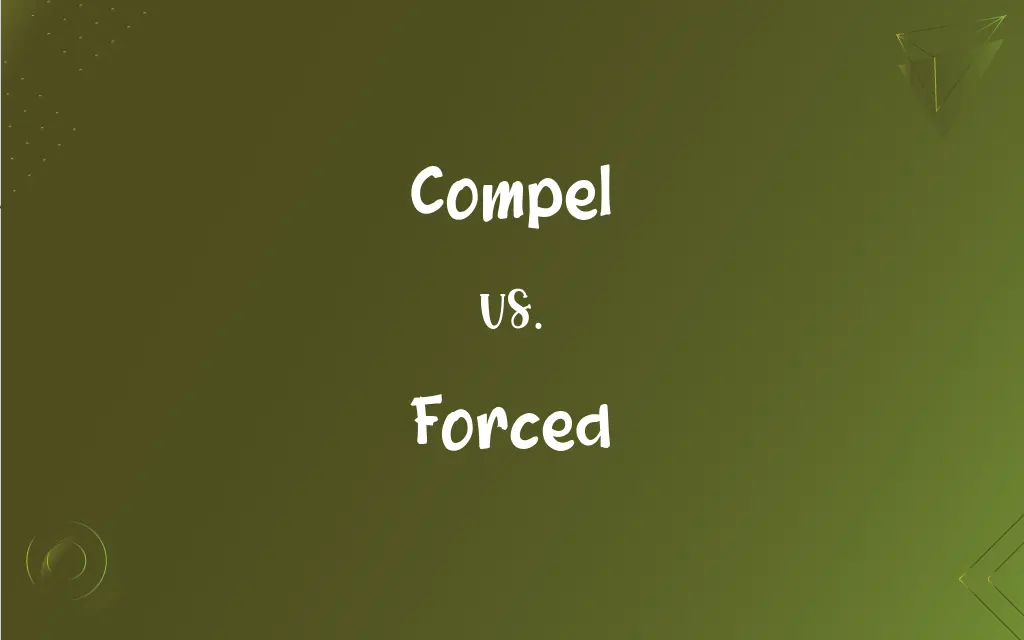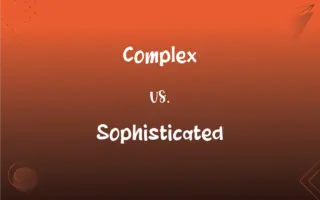Compel vs. Forced: What's the Difference?
Edited by Aimie Carlson || By Harlon Moss || Updated on November 13, 2023
Compel is to urge someone strongly to do something, often through moral or emotional pressure, while forced implies making someone do something against their will, often through physical or direct coercion.

Key Differences
Compel often involves exerting a strong, persuasive force, encouraging or obliging someone to act in a certain way, usually through non-physical means. Forced suggests coercion or compulsion through physical means or direct pressure, leaving little to no choice.
To compel someone can imply using arguments, moral persuasion, or emotional appeal to influence their actions or decisions. Being forced indicates a lack of freedom or autonomy, often involving external physical or authoritative pressure.
Compel may also convey a sense of irresistibility, where one feels internally driven to act due to compelling reasons or motivations. In contrast, forced actions are typically involuntary, imposed by external factors or entities.
Compelling situations or arguments carry a sense of urgency or importance that persuades someone to act. Forced situations, however, are those in which individuals find themselves without a viable alternative, often against their wishes.
In legal or formal contexts, to compel can mean to require someone to do something by law or authority. Forced, on the other hand, is used to describe actions taken under duress or coercion, which may sometimes be against legal or ethical standards.
ADVERTISEMENT
Comparison Chart
Means of Influence
Persuasion, moral or emotional pressure.
Physical force, coercion, or authoritative demand.
Voluntariness
Often involves an element of internal agreement or acquiescence.
Implies a lack of choice or autonomy.
Type of Pressure
Can be psychological, emotional, or based on logical arguments.
Typically external, often physical or authoritative.
Context of Use
Used in persuasive, legal, or motivational contexts.
Used when describing actions done under duress or compulsion.
Implication of Willingness
May imply some degree of willingness or internal motivation.
Suggests actions are against one's will or preference.
ADVERTISEMENT
Compel and Forced Definitions
Compel
To cause someone to do something by moral or emotional force.
His sense of duty compelled him to volunteer for the task.
Forced
Made to do something against one's will.
He felt forced to agree due to the intense pressure.
Compel
To obligate someone to act in a certain way.
The contract compelled her to finish the work within a month.
Forced
Required to act by physical or authoritative means.
The employees were forced to work overtime.
Compel
To exert a strong persuasive influence on someone.
Her passionate speech compelled the audience to take action.
Forced
Coerced into action by external factors.
The sudden storm forced them to seek shelter.
Compel
To urge or drive someone forcefully to do something.
The evidence was so strong, it compelled the jury to return a guilty verdict.
Forced
Done or produced under compulsion or duress.
The confession was obtained through forced methods.
Compel
To necessitate or require an action or response.
The circumstances compelled him to change his plans.
Forced
Imposed without consent or choice.
Her move to the new city was forced by the company's policies.
Compel
To force (a person) to do something; drive or constrain
The court compelled the company to pay full restitution. My conscience compels me to speak out.
Forced
Imposed by force; involuntary
Was condemned to a life of forced labor.
A plane that made a forced landing.
Compel
To necessitate or require, as by force of circumstance; demand
Growing riots compelled the evacuation of the embassy.
Forced
Produced under strain; not spontaneous
Forced laughter.
Compel
To exert a strong, irresistible force on; sway
"The land, in a certain, very real way, compels the minds of the people" (Barry Lopez).
Forced
Simple past tense and past participle of force
Forced
Obtained forcefully, not naturally.
The forced labor went on for 14 years.
FAQs
What does it mean to compel someone?
To strongly persuade or influence someone to do something.
Can laws compel behavior?
Yes, laws can compel certain actions or compliance.
What is a forced action?
An action done under coercion or against one's will.
Can you compel without forcing?
Yes, compelling often involves persuasion rather than force.
Can you be forced to testify?
In some legal situations, yes, under a subpoena.
Is being forced always negative?
Typically, yes, as it implies lack of choice or autonomy.
Are forced decisions valid?
They may be legally or ethically questionable if made under duress.
Can compelling be positive?
Yes, if it leads to beneficial actions or decisions.
What makes an argument compelling?
Clear, persuasive logic or strong emotional appeal.
What are compelling reasons?
Strong, persuasive reasons that urge someone to act.
How does compelling relate to motivation?
Compelling can motivate through strong reasons or emotional appeal.
Is forced labor illegal?
Yes, in most contexts, forced labor is considered illegal.
Does compelling imply urgency?
Often, it suggests a strong, immediate need to act.
Can compelling be used in advertising?
Yes, compelling advertising persuades effectively.
What is an example of being forced?
Being coerced to sign a document under threat.
What does a forced smile mean?
A smile that is insincere or done unwillingly.
Can natural events force actions?
Yes, like being forced to evacuate due to a hurricane.
Is physical force necessary to be forced?
Often, but it can also be authoritative or situational pressure.
Is being forced always explicit?
Not always; it can be implicit or subtle in some cases.
What is a compelling story?
A story that is highly engaging and persuasive.
About Author
Written by
Harlon MossHarlon is a seasoned quality moderator and accomplished content writer for Difference Wiki. An alumnus of the prestigious University of California, he earned his degree in Computer Science. Leveraging his academic background, Harlon brings a meticulous and informed perspective to his work, ensuring content accuracy and excellence.
Edited by
Aimie CarlsonAimie Carlson, holding a master's degree in English literature, is a fervent English language enthusiast. She lends her writing talents to Difference Wiki, a prominent website that specializes in comparisons, offering readers insightful analyses that both captivate and inform.































































